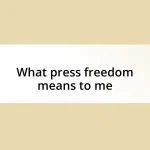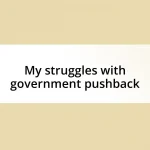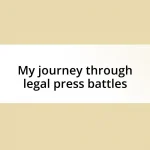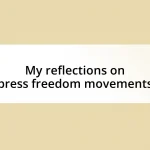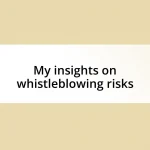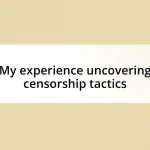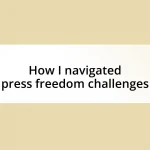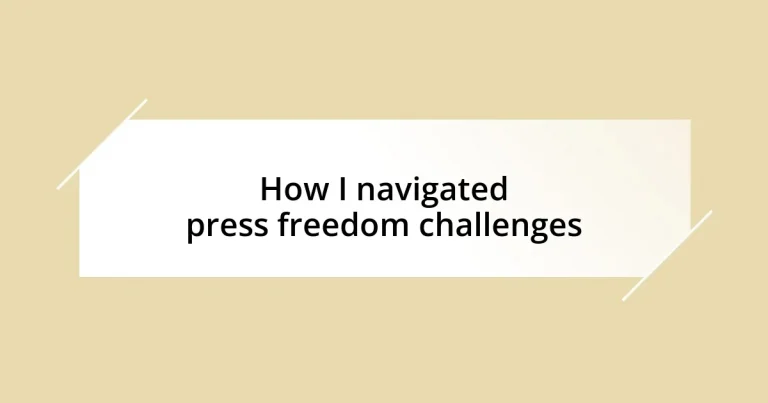Key takeaways:
- Journalists face significant challenges including government censorship, public sentiment, and resource limitations, often forcing them to navigate between transparency and safety.
- Building a supportive network and sharing experiences within the journalism community is essential for resilience and empowerment against press freedom challenges.
- Engaging with legal resources and continuously advocating for reform are crucial for protecting journalistic integrity and sustaining press freedom.
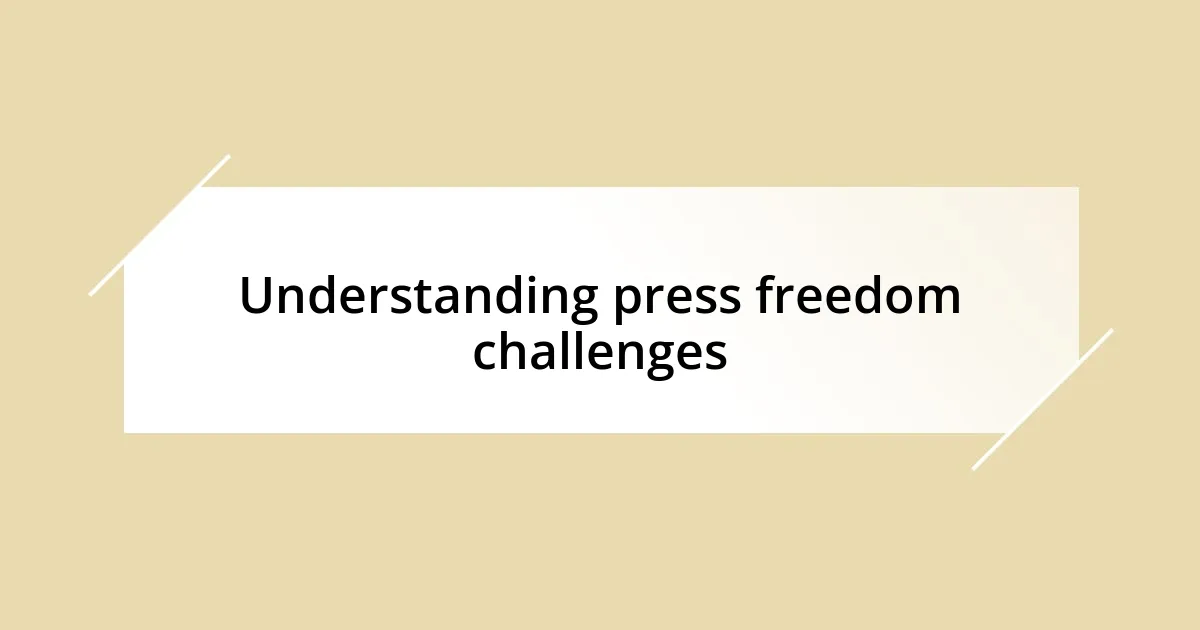
Understanding press freedom challenges
Navigating press freedom challenges is like walking on a tightrope, constantly balancing between the need for transparency and the dangers that threaten it. I remember a time when I published an article that ruffled some feathers in a local government. The anxiety I felt after hitting ‘send’ was palpable. Would I face repercussions? Many journalists grapple with similar fears, as government censorship and backlash can stifle the very voice they aim to amplify.
It’s essential to grasp how varying contexts can impact these challenges. For instance, in some countries, journalists face stringent laws that can lead to imprisonment. In my experience, working in a country with more freedom allowed me to explore sensitive topics, but I often wondered, what about those who don’t share the same privilege? This disparity can be both frustrating and enlightening, as it reveals the stark reality of information access across the globe.
Moreover, societal pressures can complicate the press landscape further. I recall a conversation with a fellow journalist who felt constrained by public sentiment; he feared that advocating for unpopular opinions could alienate his audience. This raises an important question: how do we maintain our integrity while respecting our audience’s perspectives? Balancing these elements is indeed a delicate act, yet it’s crucial for fostering an environment where diverse voices can be heard.
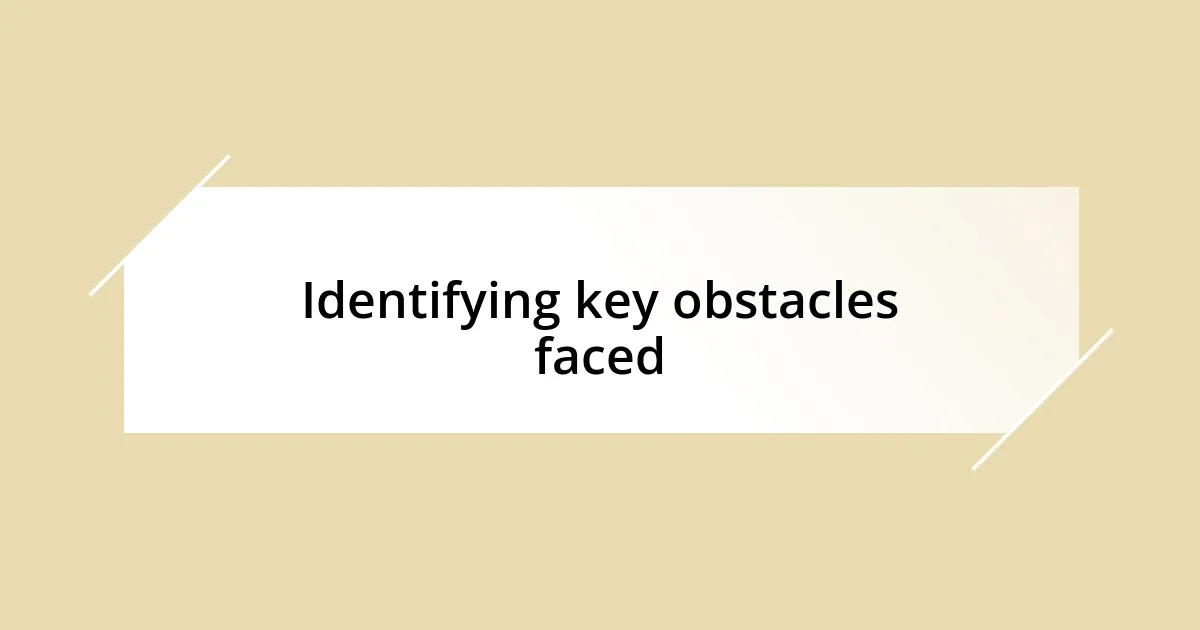
Identifying key obstacles faced
Identifying key obstacles faced in press freedom often feels like peeling back layers of a complex onion. One significant hurdle I’ve encountered involves direct government interference. I once had a story about local corruption ready to publish, but just days before, I received a call from a government official urging me to reconsider. The pressure was immense; I felt torn between my ethical obligation to report the truth and the potentially crippling consequences that could follow.
- Government censorship: Legal threats and mandates can limit journalistic freedom.
- Self-censorship: Journalists might hold back stories to avoid backlash or repercussions.
- Public sentiment: The fear of alienating audiences can lead to cautious reporting.
- Resource limitations: Many journalists lack the funding or support to pursue challenging stories.
- Legal repercussions: Potential imprisonment for publishing sensitive content raises serious concerns.
Another obstacle that stands out for me is the sheer volume of misinformation circulating online. During an election cycle, I spent countless hours fact-checking claims, only to feel like I was swimming against a powerful current. The emotional toll was considerable, as I worried that my efforts might go unnoticed in the vast sea of disinformation. How does one uphold journalistic integrity when truth seems so subjective? It’s a constant struggle that can leave you feeling powerless, yet I’ve learned that persistence is key. Each small act of integrity makes a difference.
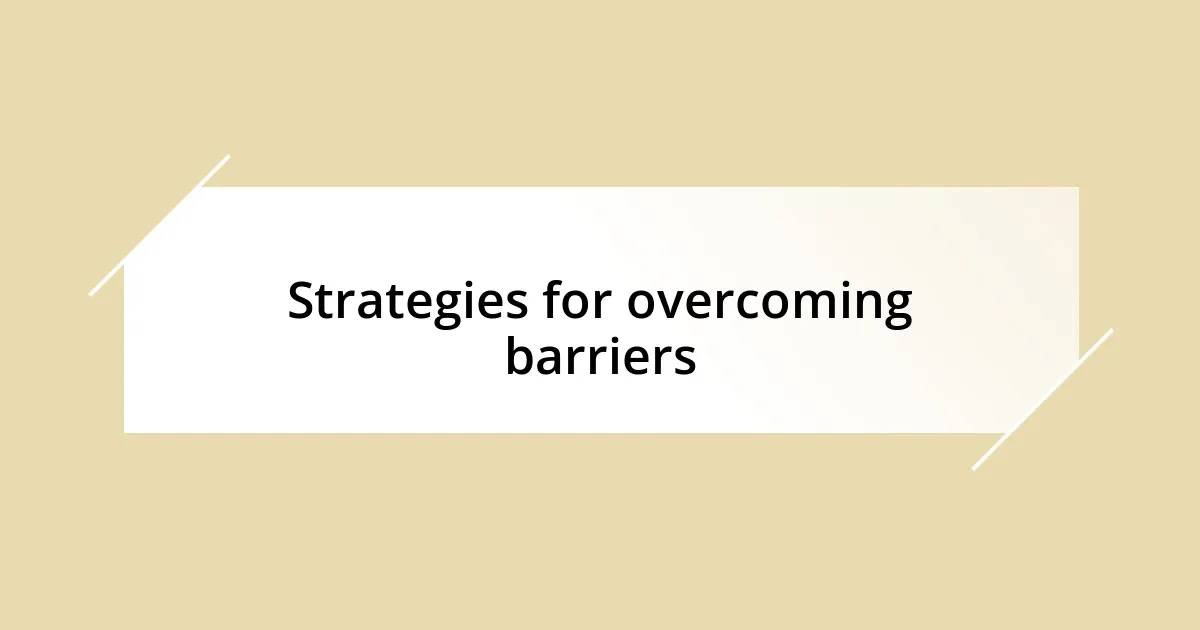
Strategies for overcoming barriers
When it comes to overcoming barriers in press freedom, adaptability is crucial. I recall a time when I had to pivot my reporting focus on the fly. I had intended to cover a local protest, but a sudden crackdown on participants forced me to change direction. Instead, I reached out to activists for interviews and covered the implications of the crackdown. This not only kept my story relevant but also ensured that the voices of those affected were still heard.
Building a strong network cannot be underestimated either. In my experience, having trusted contacts who share insights and provide support can make a significant difference. During a particularly challenging investigation, I leaned on colleagues in my network to share their experiences and tips for navigating legal threats. It was like having a safety net; their camaraderie helped me tackle my fears. Strength through community can be empowering.
Lastly, honing my digital skills has allowed me to navigate challenges more effectively. I remember the steep learning curve of leveraging online platforms for secure communication and encrypted messaging. It felt overwhelming at first, but the knowledge I gained turned fears into a sense of control. Knowing how to protect myself and my sources was liberating. With the rapid evolution of technology, staying updated on these tools can be a game-changer in ensuring press freedom.
| Strategy | Description |
|---|---|
| Adaptability | Adjust reporting focus based on current events to maintain relevance. |
| Building a Network | Engage with trusted colleagues for support and insight during challenging times. |
| Digital Skills | Utilize technology to ensure secure communication and safeguard information. |
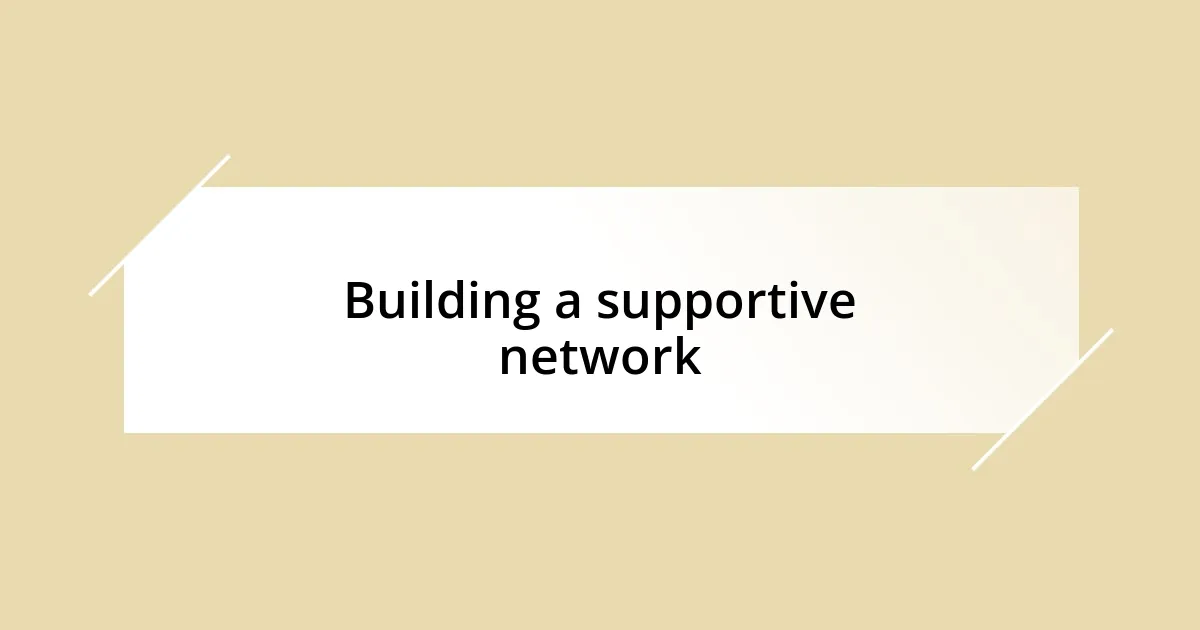
Building a supportive network
Building a supportive network in journalism is crucial, and I can’t stress this enough. I remember a time when I felt isolated while working on a controversial piece. It was in that moment of doubt that I decided to reach out to a mentor I hadn’t talked to in years. Hearing her stories about similar struggles not only renewed my confidence but also reminded me that I wasn’t alone in this fight. Isn’t it comforting to know that others have walked a similar path?
Collaboration often opens doors that solitary efforts can’t. I frequently attend local journalism meetups, where exchanging ideas and challenges creates a charged atmosphere of support. I recall a night where, over coffee, a fellow journalist shared how they tackled an ethics complaint. Their experience offered me new strategies and made me realize how beneficial it is to share vulnerabilities. After all, isn’t this what community is about—lifting each other up and growing stronger together?
Moreover, creating a network is about nurturing relationships rather than just collecting contacts. I’ve found that following up with colleagues, checking in on their projects, and offering help when I can strengthens these ties. It feels rewarding when I can contribute to someone else’s success. Isn’t it fascinating how, in lifting each other up, we often elevate our own work as well?
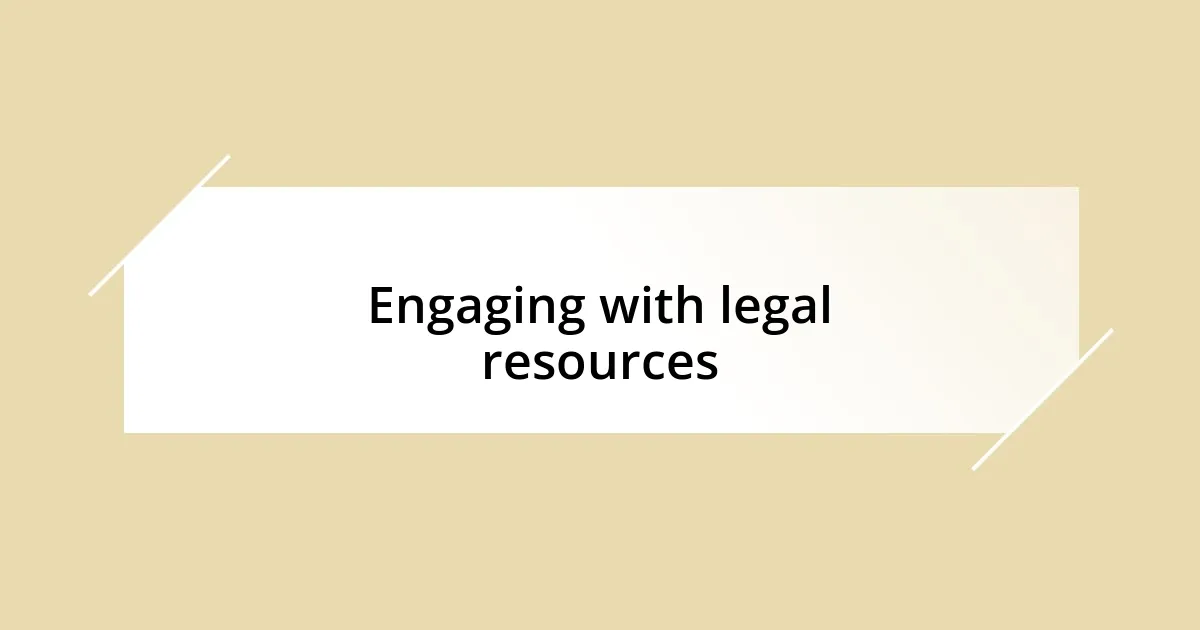
Engaging with legal resources
Engaging with legal resources can often feel daunting, especially when you’re navigating press freedom challenges. I once found myself in a situation where a source became anxious about sharing information due to possible legal repercussions. In that moment, I contacted a legal expert who specialized in media law. Their advice was not only reassuring but also equipped me with the necessary knowledge to ensure my source’s rights were protected, enriching my understanding of the legal landscape surrounding journalism.
Utilizing legal resources isn’t just about seeking help when issues arise; it’s about proactively arming myself with knowledge. I remember attending a workshop that focused on journalists’ rights and media law. It felt empowering to learn how to identify legal pitfalls in my work and understand my rights. When I walked out of that session, I had a renewed sense of confidence. I even asked myself, “If I don’t know my rights, how can I defend them?” Knowledge truly becomes a powerful tool in protecting not just my work, but the integrity of press freedom itself.
Additionally, establishing a relationship with a legal professional has proven invaluable over the years. I made it a point to reach out to a lawyer who specializes in media cases, and sharing my experiences with them opened up insights I had never considered before. They often remind me that the law can be a shield, rather than a sword, in our quest for truth. When I hear other journalists express fear about the legal system, I can’t help but ask: have you connected with someone who can help translate that fear into understanding? It’s a crucial step that often gets overlooked but can significantly bolster our confidence in navigating the tricky waters of press freedom.
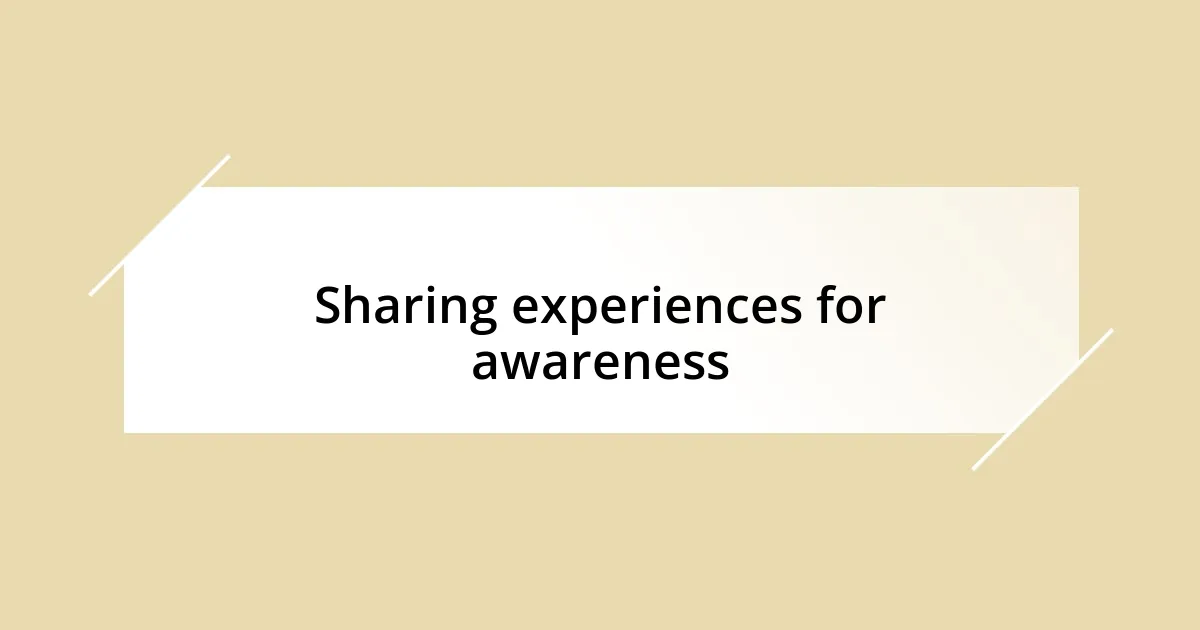
Sharing experiences for awareness
Sharing experiences is a powerful tool for raising awareness about press freedom challenges. I recall an instance during a panel discussion where I shared my journey of facing censorship. A fellow journalist approached me afterward, expressing how my story resonated with her own struggles. It struck me then how our narratives create a ripple effect, helping others feel seen and understood. Have you ever considered how your own experiences might inspire someone else in a similar position?
I often engage in online forums, where journalists exchange their stories and barriers faced in the field. One evening, as I shared a particularly harrowing experience with reporting under tight restrictions, I was surprised to see the flood of responses from others who had faced identical obstacles. It was heartwarming to witness how our collective struggles could foster a sense of solidarity and empowerment. Isn’t it remarkable how vulnerability can pave the way for connection?
Creating a space for open dialogue is essential in our line of work. I remember organizing a small meetup focused on sharing our most challenging experiences. The atmosphere was electric, filled with empathy and mutual respect. Listening to others articulate their fears and triumphs made me realize we’re not just sharing stories; we’re building a community that values transparency and support. Reflecting on these moments, I often wonder: what if every journalist took the time to share their experiences? How much stronger would our collective voice be in advocating for press freedom?
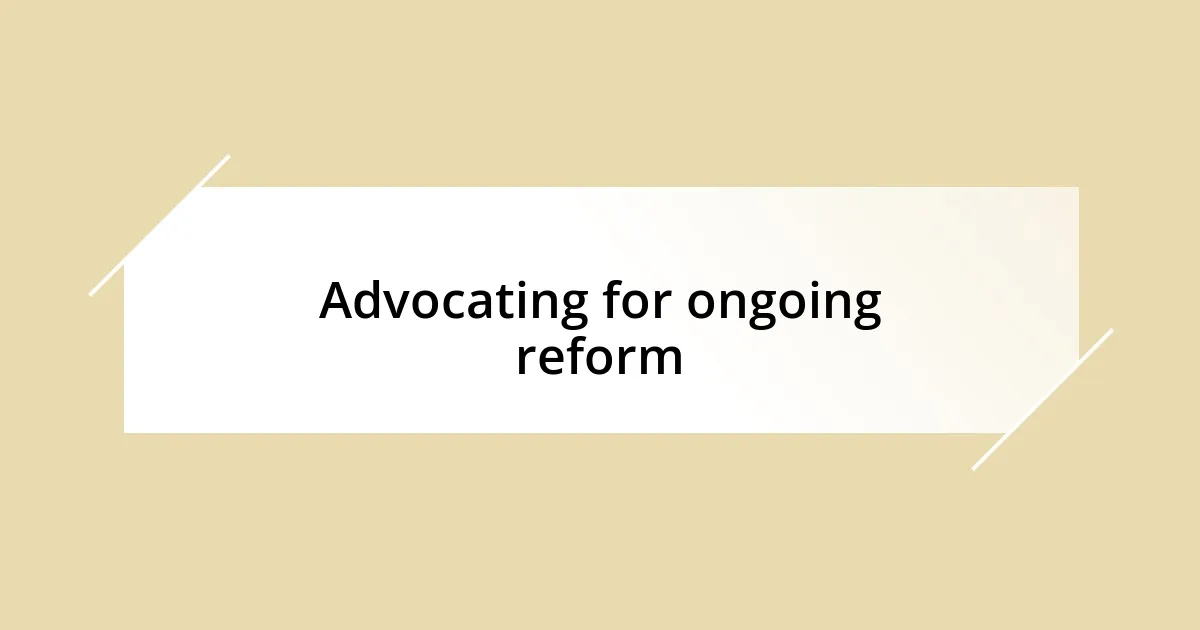
Advocating for ongoing reform
Advocating for ongoing reform is crucial for sustaining press freedom. I remember attending a rally where journalists and activists stood shoulder to shoulder, demanding accountability from those in power. The energy was palpable; it felt like I was part of something larger than myself. Have you ever felt a surge of hope in a crowd united for a common cause? That experience solidified my belief that advocating for change isn’t just a duty—it’s a shared journey.
Throughout my career, I’ve learned that reform requires persistence and collaboration. After writing an article that highlighted governmental overreach, I gathered support from fellow journalists and civil rights groups. We held discussions on strategies for effective advocacy, and it made me realize that collective voices amplify our message far beyond what one individual can achieve. Reflecting on my own journey, I often ask myself: how can I continuously evolve and harness these connections for meaningful change?
It’s not always easy to stay motivated, especially when the challenges seem overwhelming. I vividly remember experiencing burnout after a series of setbacks in advocating for new protection laws for journalists. Yet, it was a conversation with a mentor that reignited my passion. They reminded me that every small action contributes to the larger movement. This perspective shifts the burden of change into an empowering endeavor. How can we maintain our momentum in the face of adversity? For me, it’s about celebrating small victories and reconnecting with the community that fuels my commitment to ongoing reform.
